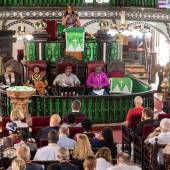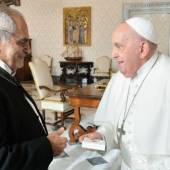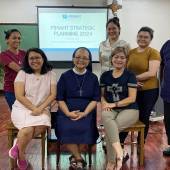Cardinal Suharyo of Jakarta presents the Indonesia that Pope Francis will meet

Cardinal Ignatius Suharyo Hardjoatmodjo of Jakarta, Indonesia, talks for Vatican News about Indonesia in lieu of the visit of Pope Francis in September, which marks his 45th Apostolic Journey abroad to four nations in Asia and Oceania.
The Holy Father will first visit Indonesia, the world’s largest Muslim-majority country with over 8 million Catholics, or 3.1 percent of the population.
After his September 3–6 stay in Jakarta, he will proceed to Papua New Guinea, Timor-Leste, and Singapore.
Cardinal Suharyo said their Catholic community is very enthusiastic to welcome Pope Francis. It was the Great Imam of the State Mosque, Istiqlal, who first announced the news, even before the Vatican announced it.
The Vatican is one of five countries that recognized the Proclamation of Independence of Indonesia. Cardinal Suharyo reminds his flock about the teachings of Pope Francis through different Encyclical letters and Apostolic Exhortations, such as Evangelii Gaudium, Laudato si, Fratelli Tutti, etc.
Cardinal Suharyo describes Indonesia as a very large country, consisting of almost 17 thousand islands and more than 1300 ethnic groups. There is freedom of religion in Indonesia, but it varies from place to place.
“There are also quite a few priests and religious figures who come from Muslim, Hindu or Buddhist families,” he said.
While many wars are crippling the world, Indonesia seems to be a model of peaceful coexistence. One of the main reasons is that foreign countries colonized Indonesia for more than 350 years before it existed.
The National Awakening Day began in May 1908 and culminated in October 1928 in an event called the Youth Pledge. A session was held at the complex of the Cathedral compound, with youth organizations with regional backgrounds declaring that they were "one homeland, one nation and one language," which is termed Indonesia.
The movement culminated in the Proclamation of Indonesian Independence on August 17, 1945.
“Indonesian independence was not a gift from the colonialists, but the result of a long struggle involving all components of the nation, involving all ethnic groups and all religious adherents,” said Cardinal Suharyo.
Pancasila consists of five fundamental principles that serve as the Foundation of the Indonesian Constitution: belief in the one and only God; just and civilized humanity; unity of Indonesia; democracy guided by the inner wisdom of the unanimity arising out of deliberation amongst representatives; and social justice for the whole people of Indonesia.
In the Preface to the Eucharistic Prayer, which is named Preface for the Country, a parallel to the exodus journey, which is not free from challenges, is seen, like the unequal distribution of prosperity, both in Java and outside Java; transnational Islamic influence; and an unfavorable economy toward the weak.
As to the Pope’s call for a Year of Prayer, the challenge is to synchronize it with the other pastoral themes. “Even without a Year of Prayer, the Catholic community in Indonesia prays diligently,” says Cardinal Suharyo.
As to the recently-issued Dignitas Infinita which reaffirms the Church's conviction that every person has inalienable intrinsic human dignity, Cardinal Suharyo said it is an excellent document and very important for pastoral guidance.
He said the witness of Christians in Asia 'do good work' like a teacher who was assigned to a large rural area where he was the only Catholic. To teach literacy in a village, he had to walk on foot for six hours, twice a week, and told Cardinal Suharyo when he was visited: 'Father, I did all this so that people here know that Catholics only want to do good.'”
As to Easter celebrations, there were four Masses at the Jakarta Cathedral Church, with an estimated 10,000 people who came to Mass. This year, the Archdiocese of Jakarta set the theme of solidarity and subsidiarity for the common good.-With input from the Vatican News
Radio Veritas Asia (RVA), a media platform of the Catholic Church, aims to share Christ. RVA started in 1969 as a continental Catholic radio station to serve Asian countries in their respective local language, thus earning the tag “the Voice of Asian Christianity.” Responding to the emerging context, RVA embraced media platforms to connect with the global Asian audience via its 21 language websites and various social media platforms.














